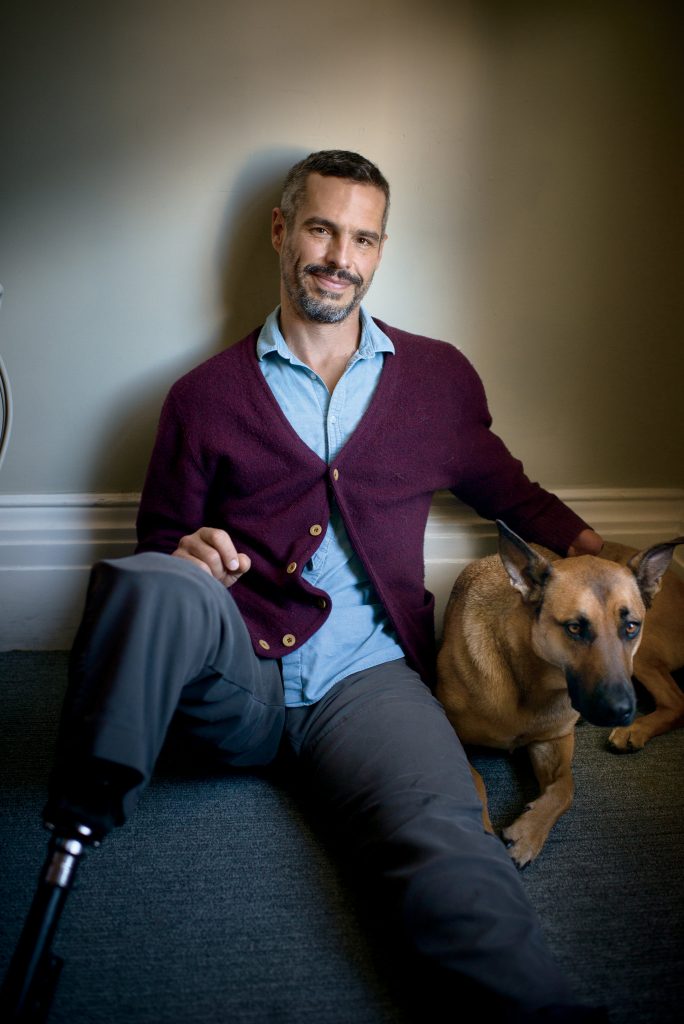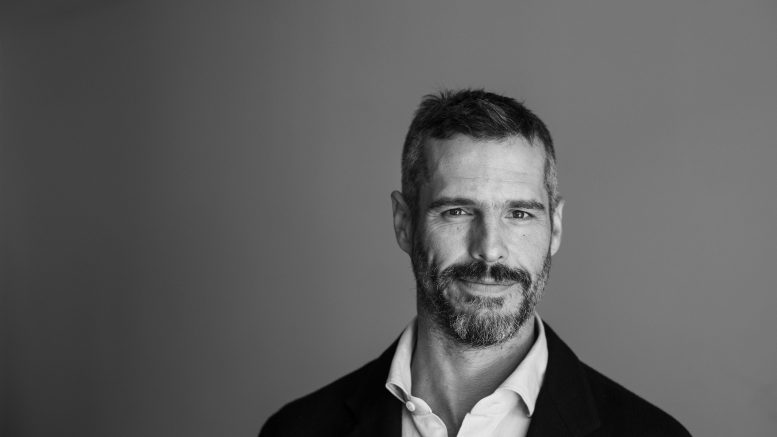BJ Miller, M.D., has a compelling personal story, and is a practicing hospice and palliative medicine doctor on the teaching faculty at UCSF School of Medicine. He is also widely known for his 2015 TED Talk, “What Really Matters at the End of Life,” which has more than 15 million views.
Dr. Miller will share his insights about death and what dying patients need most, as well as how that message helps clinicians care for all patients, at the Quintessential Care Summit, held on Sacramento State’s campus, this Friday, June 24.
But as a preview to his appearance here in town, we caught up with him for a half-hour interview. (And don’t worry, there are still tickets available to see him live on Friday.)
Based on your experience as a patient who lost both legs and an arm in a tragic accident, and as a hospice doctor, you really identified the needed changes in America’s health care system. Can you talk a little bit about what you mean when you say we need to move away from being a disease-centric health care system to one that is more of a human-centric health care system?
I’m not sure that our health care system was ever designed per se. It’s just been a sort of folly of tacking some things together.
And it shows: We have a disjointed health care system that sometimes not only doesn’t help people, but can hurt people and be brutal to work in. There’s evidence enough for everyone to realize that our health care system is a little bit sick.
We’ve got a huge (health care) workforce, an enormous chunk of our economy. Most people go into health care actually really wanting to help people. People in medical school, nursing school and chaplain school, whatever it is, go through a huge trouble for the honor to care for another human being. That impulse is beautiful, amazing and very real.
And yet what happens? How do you go from that beautiful impulse to numbed-out docs that don’t really listen to people, who don’t really tell people the whole truth? … One way is to understand that health care is not filled with malevolent or malignant people trying to hurt people.
Separating the pains of the system as an invention, as an apparatus, that’s where the problem is. So you look at that, and you start saying, Well, gosh! How is the system organized? If you spend time as a clinician you see that the health care system is really designed around diseases or illness. There’s a long history of this. The patient ends up being incidental. If you spend time as a patient in the hospital you can feel this way—your job is to kind of shut up and just put up with things.
…if instead of focusing on the disease and what we can fix, we focus on the human being, toiling or living with disease, who you know needs love and attention and support, even if they’re not fixable… Well, then, I think you’d get a very different health care system.”
BJ Miller, M.D., a practicing hospice and palliative medicine doctor on the teaching faculty at UCSF School of Medicine.
That’s crazy, and that’s not a very healing vibe. It doesn’t work well for the doctor or the patient over time. And so you start seeing the problems with focusing on a disease. Or another, perhaps more poignant, way of seeing it is in these statements—that are all too common—where a doctor says to someone, ‘I’m so sorry, there’s nothing more we can do. Your tumor is inoperable. We have no more medications that will somehow fix your problem.’ And when you’re no longer fixable, when your illness is no longer responding to our tricks, that’s the moment of abandonment. The moment where health care says, ‘Good luck out there, see you later.’ And that would be OK if we had other systems in society to pick up the slack.
But unfortunately, health care is enormous, and so much inertia is involved. And people, even if they don’t have fixable problems, are going to keep showing up in the emergency rooms. That merry-go-round is alive and well, and you see it if you work in it. You see it all the time.
So maybe, just maybe, if instead of focusing on the disease and what we can fix, we focus on the human being, toiling or living with disease, who you know needs love and attention and support, even if they’re not fixable… Well, then, I think you’d get a very different health care system.
I think it would be a very different experience being a patient; it would be a very different experience being a clinician. I think that’s what most of us long for one way or another, and it just proves elusive unless you take this into account.
If I understand you correctly, the core part of the human experience is suffering, and all of us suffer, so that common experience of suffering gives caregivers particular insight to provide more empathetic care for those at the end of life. Can you talk a little more about that?
Once you start focusing on hospice and end-of-life care, it’s a great example of when there’s nothing more to be done to fix the problem. Death is coming, no matter what you do, and so that kind of gap we’re pointing to, this space, is where medicine kind of gets awkward. It doesn’t know how to handle it, it ends up offending you, it ends up not supporting you.
So here’s a good example (of how) you focus on the human experience, the human condition. What is more elemental to the human experience than suffering? We all do it. … I have never met anyone alive who hasn’t suffered. And if you tend to that experience, and that’s what most people feel when it comes to death, if you focus there—well, you’ll be able to offer a lot of loving support to people who need it. And what’s more, you’ll get the opportunity to work from your own experience, because again, if suffering is elemental, then we all have our own experience with it. So, therefore, we can empathize with anyone else who is suffering. And if you work from that empathy, then you start attunement and handholding, and not running away from things you can’t fix. That kind of detail of suffering is a pathway, it lights up a pathway, to be with each other through dark and hard moments.
I think that sets up the issue that caregiving is such a difficult job. How do you take these more zen practices and transformative vision, implement them into institutions, and help people to provide the care? What are some of the challenges about that?
Well, (there are) many. One would be, like we talked about, is redesigning or rethinking the health care system in general, and that would right a lot of these wrongs, that would clarify many things. But it can be a little big and abstract.
More specifically, you think about two big chunks of health policy: how and what we reimburse for. The way the billing works now is we have to pathologize you. We have to find a diagnosis. We have to name whatever we’re doing so there’s a billable diagnosis code, so that we can get paid for what we’re doing.
And so we keep forcing (caregivers). You have to re-label people as anxious, for example, and they’re (just) having a normal reaction to a difficult situation. But we have to label them. We always pathologize people, normal states, and it sucks to be pathologized.
So revisiting how and what we reimburse for, and breaking up the medical model by not forcing normal life events to be problems, would be a big thing.
And right now we only reimburse doctors and nurse practitioners for their time. We don’t have great billing mechanisms for social workers or chaplains or other members of the team who shore up this kind of care.
So one big question: Is health policy specifically how and what care we pay for? What do we therefore honor, and therefore what do we develop?
Medical education is another (challenge). In clinical training, whether you’re a nurse or a doctor, we don’t get a lot of training in end-of-life care for all the reasons we’ve already said. That’s because medicine doesn’t have much to offer if you’re dying… so we don’t teach you much. The clinicians just aren’t trained. (For example,) communication has barely showed up in my education at all, and it’s hard to think of something, anything, more important than communication. And specifically listening is not a skill that we’re taught in clinical education.

We’re (also) not taught to honor our own wounds and ourselves. And the culture of medicine is brutal. If, you know, you’re depressed as a clinician, you lose your (billable) time. You lose your respect. It’s a problem to be a human being in the medical system—whether you’re a patient or a provider.
Medical education is a huge piece of this puzzle, and more specifically than that—and this is where education and policy dovetail—there’s this thing called the Flexner Report in 1910, from which all of the medical education, policy and habits have flowed. We need to revisit that—the world is very different in 2022 than it was in 1910. We need to revisit the marching orders of medicine and then a lot would flow from that.
So my answer is the two big things to look at would be health policy and medical education and to make big changes structurally, so that we can do a better job by each other.
In terms of the allocation of funding for the health care system, one of the things you mention is that the biggest impact in improving health care, on a personal and fiscal level, are things as simple as baking cookies or bringing flowers, but they are not funded by MediCal, particularly for residential care. Can you talk a little bit about the challenges of MediCal funding with hospice?
Another false divide within the medical model is that your social issues are different from your medical issues, which is nonsense. If you look at an an emergency room, it’s filled with people who are there in a medical institution for ‘social reasons.’ This is one of those false divides that really hampers medical development and you see it play out in social issues like a roof over your head, paying for residential care like a hospital like Zen Hospice. The Zen Hosts project had to close one of the most beautiful places—exquisite care, was famous the world over—because it couldn’t keep the lights on. There is no available mechanism, there’s no insurance, to cover that kind of care, even though the care in a place like that hospice saved our system zillions of dollars, because without a place like that, people are back in the emergency rooms.
And that’s a huge problem.
The Quintessential Care Summit, hosted by YoloCares and the California Hospice Network on Friday, June 24, will be the first palliative care conference in the Sacramento Valley. The event, titled the “Quintessential Care Summit: Emerging Considerations for Life’s Final Chapter,” features an exciting lineup of national thought leaders in end-of-life care and will examine the complexities of delivering exceptional care in today’s rapidly evolving world.
Featuring BJ Miller, MD as the keynote speaker, as well as Teepa Snow; Steven Pantilat, MD; Dale Beatty, DNP, RN, NEA-BC and more, the Quintessential Care Summit will explore all aspects of end-of-life care for clinicians and administers alike. Presentations will explore unique approaches to palliation, the delivery of care to underserved communities, strategies for supporting those with brain change as well as unique approaches to nonprofit healthcare advocacy and strategic leadership.
Held on the beautiful campus of Sacramento State University, the Quintessential Care Summit will be a robust one-day event for anyone interested in the end-of-life experience.
Tickets are $202 and can be purchased here: https://yolocares.org/qc-summit/






Be the first to comment on "Dr. BJ Miller is the keynote speaker at an end-of-life conference this Friday in Sacramento"